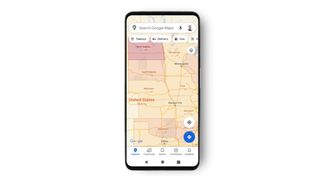
Google has created a new, optional “COVID-19 Info” filter that, when activated, color-codes your app to show the severity of coronavirus cases in your area.
The app will show a “seven-day average of new COVID cases per 100,000 people”, as well as an arrow image indicating “whether the cases are trending up or down,” explained Google Maps Product Manager Sujoy Banerjee in a blog post.
As you zoom in or out, you should be able to see COVID-19 averages on the national, state, county and city-wide level, wherever the data is available.
The app will compile this information from data collected by Johns Hopkins University, the New York Times, and Wikipedia — which in turn get their data from the World Health Group and government well-being ministries. Coming from a number of sources, the app’s numbers should hopefully be as correct as potential.
Banerjee stated that the characters could be out there in “all 220 countries and territories that Google Maps helps,” and will roll out in updates to iOS and Android Google Maps apps this week.
With the Google Maps COVID-19 filter activated, commuters should have the most up-to-date data available to resolve whether or not they should keep away from the subway or local movie theater for now, or delay that trip to an area with numbers trending up.
Google versus COVID-19
Google has made several other helpful COVID-related updates to its apps in an effort to give customers the knowledge they should keep secure and healthy.
In June, Google updated Google Maps to alert you if you deliberate a route on public transit that could be affected by COVID-19 checkpoints, and offered a crowdedness filter that may warn you to keep away from sure transit times with unsafely crowded trains.
Google has also teamed up with Apple to create contact tracing technology for COVID-tracking apps to implement that may silently monitor different app house owners who get shut. With widespread sufficient adoption, customers might monitor their publicity and well-being officers might see who somebody with an optimistic check has come into contact within the latest days. Whereas this has negative privateness implications, Google defined how technology should hold consumer data virtually anonymous.